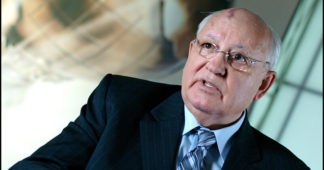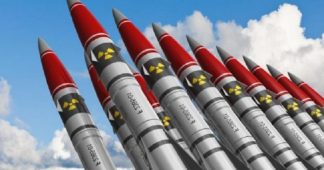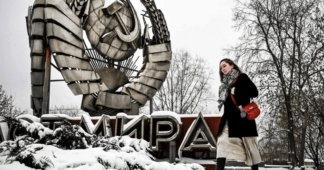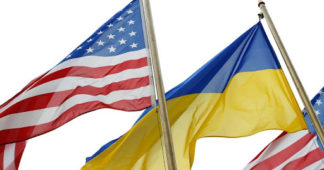Part I: Results and consequences of the Soviet collapse
First of two articles
Read the second one here
By Dimitris Konstantakopoulos
Aug 14, 2022
Thank you very much for your invitation to participate in this very important debate, an invitation both honorable and very interesting for me. (*)
There is a tendency nowadays to examine the cultural questions and among them the question of values independently of the socio-economic, material processes and also from geopolitics. I believe it is a huge mistake, and this is why I will try to combine the examination of social, international and cultural processes.
A defining moment of our world: Gorbachev’s perestroika
I have followed closely, as a correspondent in Moscow, the late perestroika and Yeltsin’s period. I remember Soviet President Gorbachev proclaiming very important ideas. Some of them are today more relevant than at the time he spelled them out. But, as Faust puts it, show me the goal, but show me also the way to achieve it. Mikhail Sergeyevitch did not know the path to his goals. As a consequence, social and international forces and dynamics working not for the reformation, but for the destruction of the soviet society and the state hijacked his reform.
I was in Moscow when Russia was building the symbol of the new religion of Money to replace communism or whatever it was, the biggest McDonald in the world. I see now its signs demolished, the red flag appearing spontaneously in Donbas and other places, the czar of the privatizations quitting the country. Russia is forced to enter a new era in its history, but nobody can predict with certainty what will be its characteristics. The choices you will make now will shape your country but they will shape also the world, to some extent at least, given Russia’s importance.
A disaster in the ‘90s
I belong to the extremely few western observers who can claim to have correctly understood and predicted the disasters which would inevitably follow the way the Soviet system was dismantled and replaced by a worse, not a better one. I feel vindicated by what followed the destruction of the USSR, although I am not of course happy with what happened.
Back in 1992, everybody was speaking about the “end of History” and the new era of the “Eternal Peace”. At that time, I wrote in an article that the “Cold War will begin again, but not from Berlin and Kabul, as in the past, but from Kiev and Tashkent”. By Tashkent I had in mind not precisely Uzbekistan, but the south of the USSR. Most people were thinking that I make crazy predictions; such was the confidence to the peaceful character of the new period opened by the soviet collapse (which some would rather call a suicide).
I do not say all that to praise myself but only to prove that what followed the soviet collapse was easily predictable. The reason I was able to make the prediction about the new Cold War thirty years ago was rather simple. I had studied Thucydides, Hobson and Lenin on imperialism and I had followed closely US foreign policy. I find deeply ironic that in a country, which made a god out of Lenin, nobody in its leadership was interested in studying his work!
As for the social and economic effects of the so-called “transition”, they were also easily predictable by anybody who adopted a critical analysis of how the international system of Capitalism is working.
I find very positive that we face now a Russia different from the country I have known 30 years ago, defending its interests and not willing to submit to even the most irrational Western diktats. This is good not only for you but for all humanity. I hope of course that the present crisis around Ukraine will end soon in a way promoting world peace and stability and leading us to a better world.
Back in the 90’s, Mikhail Gorbachev, then visiting Greece, asked the conservative President Karamanlis what gift he would like to bring him from Russia. “Bring us Russia back”, the Greek President answered to him. We are happy that Russia is back even if we would prefer of course that this would happen in less tragic circumstances than the present ones.
It has been correctly said that the soviet dissolution was a major geopolitical catastrophe, not only for the Soviet peoples, but also for all humanity. Western capitalism and imperialism (and there is no capitalism without imperialism in our epoch) felt unhindered to show their most abominable face, destroying Yugoslavia and half a dozen countries in the Middle East, abolishing any restrictions to the activities of Financial Capital and attacking without mercy the European welfare system.
A social and cultural disaster
But the soviet collapse, or soviet suicide if you prefer, was not only a geopolitical disaster. It was also a social, economic, demographic, cultural and moral one. The introduction of the capitalist relations of production and distribution and of the corresponding cultural “superstructure” in the former USSR led to the deeper economic, social and demographic crisis in all industrial era, comparable with the periods of world wars and much deeper than the 1929 crisis, if measured by the fall of GDP, of investments, of living standards or of life expectancy. The fact Russia was able after all to stand to its knees after that period can be considered as a miracle.
Russia was also pushed into a huge and rapid transformation of all its value system, the essence of which was the autonomisation of the sphere of the economy from the sphere of morals (ethics). Western capitalist societies underwent the same transformation, but it took them some centuries, not some years, and huge popular, revolutionary and reformist movements, parties and trade unions counterbalanced its consequences.
It was the introduction of Capitalism itself and the incorporation of the ex-USSR into the world capitalist system which needed and which provoked all those disasters, geopolitical, socioeconomic, demographic and moral, which were not but the multiple facets of the same historical process, that is of the overthrowing of the system of planned economy, the introduction of capitalist relations of production and distribution, the destruction of the Union and the incorporation of the ex-Soviet republics into the western, capitalist world.
This process needed and provoked the collapse of the dominant system of values in the soviet society, including the renunciation of Socialism, the official ideology of the soviet state and society. It also destroyed the very raison d’etre of the Soviet Union.
Objective and subjective factors
I don’t believe in strict and automatic historical determinism. The outcome of a historical process and in particular of a crisis is never completely predetermined, it is the synthesis of the results of the objective and of the subjective factors working and influencing the outcome, it has an intrinsic random (stochastic) character.
Although nobody could predict what finally happened in the USSR, we have also enough proof that the great strategic lines of this gigantic transformation were delineated much before the process was started by western strategists and theoreticians working hand in hand with a part of the soviet nomenclatura. But such a project could not succeed if it had faced a serious strategically thinking subject inside the soviet leadership of the time. Here the long soviet decline has met the objective pressure of the world capitalist environment (and the usual subjective conspiracies) to produce the end result in the form of a collapse of the Soviet state and of Soviet economy and society.
At this point I want to make some clarifications, necessary in order to be correctly understood. I do not consider USSR or China as capitalist and I do not consider them also as socialist countries (socialism in its original sense means self-managed societies). Both were/are systems of planned economies, either by administrative, overcentralised mechanisms (USSR) or by extensive use of market mechanisms (modern day China). But, in both cases, it is not the Capital, which dominates the State and takes the final decisions. Capitalism means the system of domination of Capital over society and the state.
Who is to blame? Capitalism or the way it was introduced?
Some people will claim that it was not the introduction of capitalism and the incorporation to the world capitalist system itself but the rythm and the method chosen to do it that were responsible for the disasters, which followed, in the Soviet example. They will argue that China offers a counter example.
But the example of China is misleading. In China neither the regime of planned economy or the political regime were overthrown, they were reformed to incorporate many more market mechanisms. China did enormous concessions to capitalism, still it was able to control the process of market reforms and introduction of foreign capital, instead of being controlled and dismantled by it. Although we cannot be certain about the future of China, it never submitted itself, up to now, to the rules of financial globalization that is to the power of a handful of huge international banks and other private financial institutions. China has also preserved the official ideology of socialism. The communication policy of the CCP has always kept the image of the West as an enemy of China – the opposite of what did the CPSU, which has itself delegitimized the Soviet regime through the way it applied the policy of glasnost, transforming it from a potential tool of useful social and political dialogue into an instrument of unbelievably uncritical idealization of the West. (There is now maybe an opposite danger: to dismiss easily everything deemed “western”).
To put it in a formula, China has never done the qualitative leap to Capitalism the USSR has done.
A gigantic experiment
The dismantling of the “soviet socialism”, of the USSR and of the system of its alliances was a gigantic social and geopolitical experiment of world significance from which two conclusions can be derived:
a) There is no room for new equitable partners in the club of (less and less by the way) prosperous developed capitalist countries. For Sweden and Switzerland to exist, a lot of Burkina Faso and Niger must also exist, because the development of the system is uneven and combined. This is a law concerning the way international capitalism is working and has been confirmed time and again.
The deepest reason Russia and China had to follow the path of so radical revolutions in the past, without which they would never become superpowers, was that they were incapable of developing themselves in the context of the international capitalist system.
The fact that the West did not accept Russia as an equal partner despite all the constant efforts of Russian leaders to achieve that is also a confirmation of the same law.
The same is true of the fact the EU cannot function but by increasing inequality among its members (the opposite of what the USSR was doing). And there are dozens of countries around the world destroyed and not developed because they applied the IMF’s receipts.
b) Western Capitalism and the USA had a very rare historical possibility to show, during a quarter of a century of nearly unhindered rule on the globe, what they can accomplish. The result is here for all to see. Wars against the popular classes of the developed countries themselves, very serious ecological and economic crises, tendency to go to War with Russia, with China, with Iran and with every slightly independent entity in the world, war against Nature. If western capitalism was unable to develop the technologically and educationally very advanced ex-Soviet space, what it can offer to Africa?
«Αρχή άνδρα δείκνυσι» (“The power shows the Man”) were saying Ancient Greeks. The nearly unhindered rule of Western Capitalism, of the Financial Capital and of the USA on the world for more than two decades proved beyond doubt that this system is unable to address the huge problems in front of humanity but also, more and more, the problems faced by the core western countries themselves. Our whole civilization needs to be reformed in a fundamental way.
* This text is based on the speech of the author at a debate held in the Valdai Club on June 30th, 2022, with the participation of Oleg Barabanov, Programme Director of the Valdai Club, Konstantin Bogomolov, Director, Artistic Director of the Theatre on Malaya Bronnaya, Andrey Fursenko, Assistant to the President of the Russian Federation and former Minister of Education and Science of the Russian Federation, Dmitri Trenin, Member of the Council on Foreign and Defence Policy and Liu Zhiqin, Senior Research Fellow at the Chonyang Institute for Financial Studies at Renmin University of China (RDCY).
We remind our readers that publication of articles on our site does not mean that we agree with what is written. Our policy is to publish anything which we consider of interest, so as to assist our readers in forming their opinions. Sometimes we even publish articles with which we totally disagree, since we believe it is important for our readers to be informed on as wide a spectrum of views as possible.










